Two Venezuelan human rights activists living in exile in Colombia were wounded in a targeted shooting on Monday afternoon in northern Bogotá, an attack that has renewed fears over the safety of political dissidents in the country. The assault took place just days after Venezuelan opposition leader María Corina Machado was awarded the 2025 Nobel Peace Prize, adding a layer of political tension to an already volatile regional landscape.
According to the National Police, Yendri Omar Velásquez, an LGBTQI+ activist and human rights defender, and Luis Alejandro Peche, a political consultant with dual Venezuelan–Colombian citizenship, were leaving their residence in the Cedritos neighborhood of Usaquén when assailants opened fire. Two men exited a vehicle and shot at least ten rounds at the pair before fleeing. Both activists had sought refuge in Colombia in 2024 after facing persecution in Venezuela.
Velásquez was shot in the arm and underwent surgery; he remains under police custody in a medical facility and is expected to undergo a second orthopedic procedure. Peche was shot twice in the legs; doctors said no vital organs were compromised. Police quickly established a security perimeter around the hospital, restricting access to authorized personnel, including representatives from Amnesty International.
Investigators recovered modified “traumatic” weapons from a vehicle abandoned in Suba, northwest Bogotá, which they believe was used by three attackers. Authorities are treating the incident as a contract-style attack. Early evidence suggests the assailants were living in the same building as the victims, just two floors below, raising questions about the level of surveillance or infiltration that preceded the assault.
The attack comes at a moment when Colombia’s protection agency is under scrutiny following the assassination of presidential candidate Miguel Uribe Turbay. With nearly three million Venezuelan migrants and refugees living in the country, human rights groups have long warned of strained assistance centers, the absence of an active national migration coordinator, and limited resources for the National Protection Unit (UNP). Social organizations say these deficiencies have left asylum seekers and human rights defenders without effective security guarantees.
Bogotá Mayor Carlos Fernando Galán condemned the shooting and announced that the police have launched intelligence operations to track down the perpetrators and identify those behind the plot. “In Bogotá we receive, accompany, and support those fleeing political persecution, so that they can safeguard their integrity, preserve their freedom, and continue their leadership,” Galán said.
President Gustavo Petro, who maintains close political ties with Venezuela’s Nicolás Maduro, pledged to expand protection schemes for foreign human rights defenders in Colombia. “Venezuelan citizens seeking asylum in Colombia – regardless of their views – are welcome,” he said.
The muted statement appears to reflect the leftist president’s ideological alignment with Caracas while attempting to balance a dire human rights situation at home. Unlike Galán, Petro refrained from directly mentioning the victims’ political activism or the transnational implications of the attack.
Amnesty International strongly condemned the assault, calling it “unacceptable” and urging authorities to conduct a thorough, independent investigation. Ana Piquer, the organization’s Americas Director, warned that Venezuelan activists in exile face increasing risks and that the Colombian state must ensure “prompt and effective protection” for those fleeing persecution. Other NGOs and Colombia’s Ombudsman’s Office echoed the call, emphasizing the state’s obligation to safeguard migrants and asylum seekers.
Political Reactions from Venezuela’s Opposition
The attack has triggered forceful reactions from Venezuelan opposition leaders Edmundo González Urrutia and María Corina Machado. González, widely regarded as the legitimate winner of the July 28, 2024 presidential election, warned that “transnational violence has reached Venezuelan activists in exile.” He demanded urgent measures from Colombian authorities to protect dissidents and investigate the attack thoroughly. “Both activists fled persecution in search of refuge and protection, but violence has followed them into exile,” remarked González.
Machado, who received the Nobel Peace Prize last week for her role in leading Venezuela’s democratic movement, denounced the assault as “a serious aggression not only against them but against the entire human rights movement in the region.” She urged the Colombian government to conduct a “transparent and urgent investigation,” identify those responsible, and strengthen protection for exiled Venezuelans.
“Yendri escaped the regime’s persecution after being kidnapped in 2024 for his work as a human rights defender. Luis Peche is also a target of the dictatorship. This attack is a direct challenge to the principles of protection and human rights,” said Machado.
Both Machado and González have become symbols of Venezuela’s opposition following the rigged 2024 election, in which the National Electoral Council declared Maduro the winner with more than 51% of the vote – result rejected by large segments of the international community, including the United States. González has since gone into exile, while Machado’s international profile has risen sharply following her Nobel Peace Prize.
The Bogotá shooting underscores what human rights groups describe as the growing reach of authoritarian regimes beyond their borders. In recent years, Venezuelan dissidents, journalists, and activists have reported surveillance and intimidation in neighboring countries. Monday’s attack represents one of the most serious assaults to date against Venezuelan refugees.
For Colombia, the incident poses a critical test of its ability to protect foreign nationals and maintain its reputation as a safe haven for political exiles. For Venezuela’s opposition, it serves as a chilling reminder that persecution does not end at the border.
As Velásquez and Peche recover under police protection, investigators continue to search for the three suspects and determine who ordered the attack. The outcome of this case could have wide repercussions: not only for regional asylum policies, but also for Colombia’s struggle to confront transnational crime.

